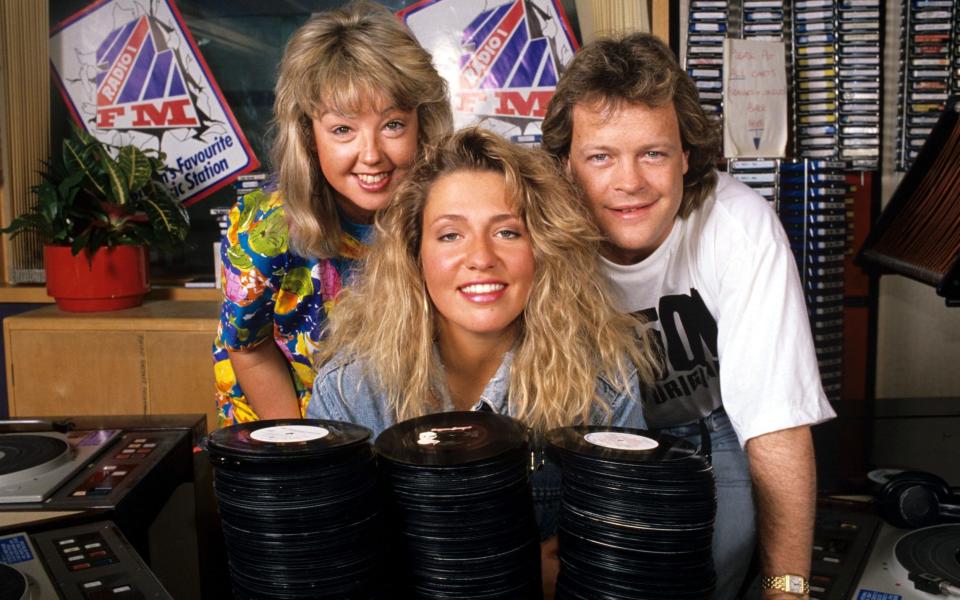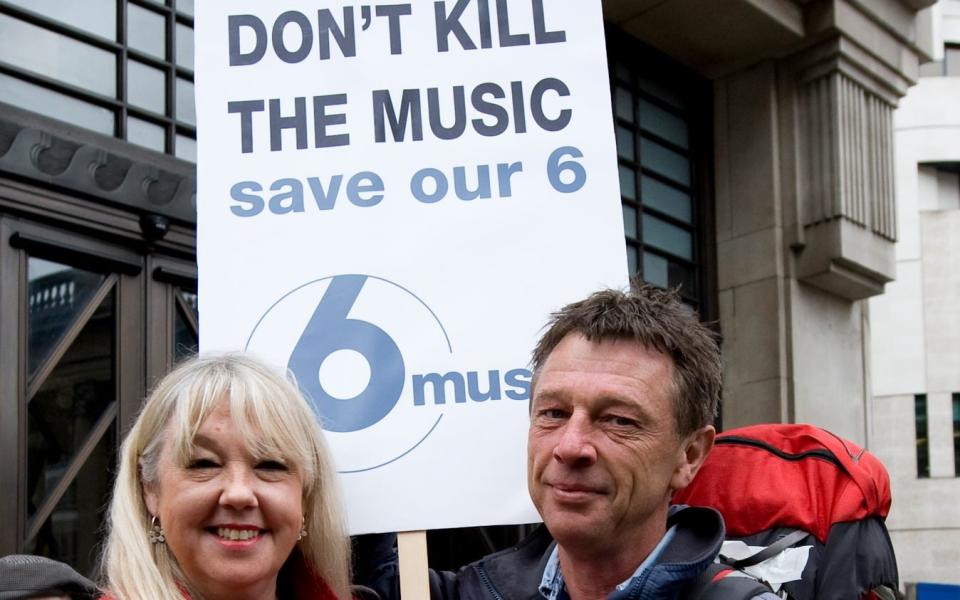Liz Kershaw: 'BBC management should tell the truth and be accountable'

It’s a double-edged prefix, “veteran”. It implies wisdom, talent and experience, but there’s always that slight suggestion you might be keeping a seat warm. Veteran broadcaster Liz Kershaw knows a thing or two about inhabiting this particular label, and in the most spectacular way.
At 61 (hardly any great age), she is the second longest serving female presenter on BBC radio, behind Annie Nightingale. She has DJ-ed on a whole host of the Beeb’s national stations, was instrumental in founding BBC 6 Music, the digital-only radio station specialising in alternative music, in 2002 - and then in saving it from closure in 2010. She celebrated 30 years as a national broadcaster in 2017, and her Saturday show recently clocked yet another set of record listener figures.
Kershaw is also among that small army of BBC talent that speaks truth to power. And, in her own words, after some of the comments she has made about her employer over the years, if they were going to get rid of her, they’d have done it by now. So how has she managed it? Is it as tricky as it seems to be outspoken at the BBC? “Oh yeah. I did speak up for myself with trepidation, always, and was treated like a naughty fifth former.
“When I got to my 30-year landmark, I thought you know what if they bump me off now I’ve had a good run, so I’m going to say what I think. I think you should speak the truth.
“We’re paid for by a poll tax. Every person who pays the licence fee, we’re servants of theirs. I think it’s a privilege, I’m a conduit for them. So the BBC management should tell the truth and should be accountable. Also when you claim to be one of the world’s most premier, relied-upon news outlets, you should be telling the bloody truth.”

She proved her mettle in 2012 when the corporation tried to force presenters to set up companies through which they would be paid as freelancers. Kershaw ended up giving evidence to two Commons select committees about the way the BBC treats and pays presenters. “I took advice from my accountant and an employment barrister and I confirmed what I thought I already knew which was this was just for them to avoid giving us holidays, maternity leave, sick pay, and them paying national insurance. So I said I wasn’t doing it.
“I didn’t get paid for six months. And I spoke out publicly about it, and they denied it and denied it.
“Then - oh, hello 2018 - we’re in the House of Commons sitting before the DCMS, telling them. We’re sitting there giving evidence and then they haul [director general] Tony Hall in the week after, and I’m thinking: ‘Oh, I’m going to be popular…’”
Kershaw is disparaging about BBC management – Lord Hall is “a really nice man, but W1A [the comedy about working life at the BBC] wasn’t fiction”. “I’ve seen how the management operates,” she says as we drink coffee in her kitchen on the Kent coast.
“I think the worst era for me was that of Teflon Thompson [Mark Thompson was director-general from 2004 to 2012]. All the shenanigans then: people retiring with £4million pension pots and £800,000 cash sums, when they’d completely messed up and brought the BBC into disrepute along the way. They were bad times.”
Times have changed, admits Kershaw, but the BBC presenters’ WhatsApp group is still awash with behind-the-mic gripes. “It is really stressful for a lot of people,” she says. “Local radio losing audience. Budgets cuts. All this business of gender equality… people finding out they’re on a lot less than their co-presenter. Hello? I’ve been used to that since 1987.
“There are a lot of presenters out there who don’t feel appreciated. At the end of the day, they’re the goods in the shop window. They’re the products on the shelf. And they should be foremost in management’s minds. But we never have been. We’re just like pawns in the game.”
This was made clear in 2010, when Kershaw and others fought to save 6 Music from closure. “What shocked them I think [was] the people who revolted, the listeners. They were their neighbours, the middle-class, broadsheet newspaper-reading professionals.
“I remember when we went to the pub with them all after one demonstration, there was an astrophysicist there and I think that shocked BBC management - that these A1s were the people who were getting megaphones and going on the streets and they didn’t realise who was listening.
“I think [BBC management] see each other in Chiswick and Hammersmith, and certainly never venture outside the M25. They’re all on huge salaries and have jobs for life, and none of them really live in the real world.”
Ten years on, BBC 6 Music celebrated its 18th anniversary this week, and these days is held up as an example. “Whenever the BBC wants to defend the licence fee, they cite 6 Music as a distinctive service with a cultural remit for the UK, which serves a unique group that commercial radio wouldn’t attempt. So they use us now as the big golden example of what the BBC should be doing.”
Kershaw is used to her mouth getting her into trouble. In 2015, she was criticised for a string of tweets following the death of singer Cilla Black (in one, she said the ‘national treasure’ “loved Liverpool so much she lived in Surrey and Spain”). Then, in 2018, she accused the police of wasting resources after she was prosecuted for driving at 36mph on a 30mph road: “Isn't speeding without causing injury the same as giving someone a menacing look without attacking them?” she wrote on Twitter.

Does she ever worry, I ask, about being rapped on the knuckles one too many times for her honesty? Not a bit. Even when she’s been “hauled in” at work, she has felt “upset and shaken, but also outraged”.
“I’ve said: ‘Excuse me, last time I looked, we had freedom of speech in this country. I might work for you but I’m also a citizen of the United Kingdom and I’m allowed to express an opinion.’”
Kershaw would never express an opinion on her show, other than about music. “When I did news and current affairs shows on 5Live, the biggest compliment when I was leaving was we all went out and [the team] said: ‘Liz, what do you vote? Because we’ve never been able to tell.’” For the record, Kershaw voted for Brexit, and is an unabashed cheerleader for the new Prime Minister: “I think he’s fiercely intelligent and has knuckled down really well. He’s the best kind of Tory - a philanthropic Conservative.”
These are not views often heard at New Broadcasting House, the BBC headquarters and lodestar for the metropolitan liberal elite. Not that Kershaw is easily silenced. A mother of two grown-up sons, she got into a spot of bother in January, when she responded on Twitter to a new campaign by the government that offers free tampons to school pupils. “Sorry if this is gross, but ‘period poverty’? FFS!” she wrote. “My mum had to use old rags which my grandma boiled-washed and she re-used. How did she ever manage to get a scholarship to grammar school, go to university and become [sic] a headteacher without free tampons?”
It caused something of a Twitter pile-on, sparking fury among many users, including Amika George, who launched the Free Periods campaign which lobbied the Government to fund sanitary products in schools. George responded: “Without access to period products every month, young girls have yet another thing to worry about at a really challenging time in their lives. In 2020, no girl should be boil-washing rags. I think that is totally unacceptable.”
That isn’t exactly what she meant, says Kershaw, who stands by her post. “I was not saying that girls should be going around with rags in their knickers in this day and age. I’m talking about during the war, and I was saying that my mother – who I’m proud of – had overcome that.
“It wasn’t an educational matter, it wasn’t a responsibility of the education system. It was a family thing, and they got by in whatever way they could. So I was saying it’s a personal issue, not something schools should have to take on.”
She received as much support as she did animosity, and believes many felt as she did that this was “another case of some lobby group piling on the emotional blackmail and pressure”.
“Well, I’m sorry but the 4,000 new followers I got that day didn’t agree with all the outraged people. A lot of people got what I was saying.
“If I had a daughter, if I was unemployed or on my uppers, would I let her go to school without tampons? No, I’d give something up myself.
“If someone wants to introduce me to a family that honestly can’t afford £1 for a packet of tampons from Tesco, then I’d be the first to put my hand in my pocket and help them. But I don’t believe that if you prioritise properly you’d find yourself in that position.”
Every time Kershaw speaks out, she vows to be more cautious. “I am careful,” she tells me in that smoky Lancashire drawl as she has a cigarette by the backdoor. “If someone wants to pay me to be a gobshite and get flack, fine. But otherwise I’m going to tweet my recipes and say: ‘Hello, what a lovely sunrise over the English Channel this morning’. People can fight it out among themselves, because actually I’m quite happy.”
I imagine she might struggle to hold back the next time she encounters injustice, but for now she is adamant she wants “a quiet life”. “I’ve been brave and I’ve been honest and I’ve seen how the management operates.
“But I’m very, very proud of the British Broadcasting Corporation. I believe in it.
“I’m happy because I’ve not played the game, but kind of have, with my tongue in my cheek - and I’m still there 33 years later.”
These days, Kershaw likes to think of what she and many others at 6 Music do as “behind-the-bike sheds broadcasting”. “There’s just a handful of us, and we get on with it week after week and we get results. You get ‘You’re all doing very well, carry on’.”
She won’t overstay her welcome, though. “I’ll do it as long as I’m wanted. There’s no physical reason not to. I don’t want to be a bed-blocker for other talent coming up. But, on the other hand, I think there’s a lot to be said for knowledge and experience.
“John Peel might still be on the air if he hadn’t died at 65. As long as I’m compos mentis and I’m articulate and witty and on top of things, why should I give it up at 61?”
Liz Kershaw is on BBC 6 Music every Saturday, 1pm


